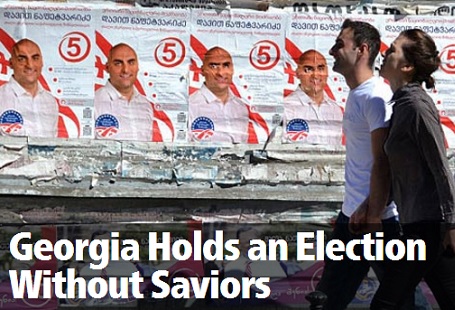Carnegie Europe: “Georgia holds and election without saviors”


"Georgia is embarking on a parliamentary election that is unusual by the standards of the surrounding post-Soviet region for being so normal,” writes Thomas de Waal, a Senior Associate at Carnegie Europe.
De Waal has written an interesting piece about Georgia’s election environment and the political players who have tossed their hat in the ring for the October 8 Parliamentary Election.
He notes how this year is the first time in Georgian history there is no "big charismatic figure dominating the headlines” as neither of Georgia’s two titans – ex-president Mikheil Saakashvili and former Prime Minister Bidzina Ivanishvili – is on the ballot.
For the first time since Georgia’s first free election of the modern era in 1990, there is no savior in sight, just a selection of ordinary politicians, writes de Waal.
A survey conducted over summer 2016 showed 67 percent of Georgians said they were likely to vote, but 57 percent were still undecided as to whom to choose. One of those behind the study noted the findings were worrying but said they could be interpreted as a sign that Georgian voters were more mature and savvy than before about their politicians.
This year there were more choices and people were more aware of the party’s policies, so could make a better informed decision.
There is a favorite to win the election on October 8—the current governing Georgian Dream party—but victory is not guaranteed. The vote is expected to be free and fair, despite the problem that outside the capital, the ruling party is unduly powerful and will easily win many seats in the contests for the country’s single-member constituencies. All the same, other parties can also expect strong representation in the parliament and may stop Georgian Dream from achieving an outright majority.”
This was a stark contrast to Russia or neighbouring Azerbaijan, and something that Western countries, the EU in particular, should not just welcome but celebrate, and follow up with more support for Georgia, he says.
De Waal says the outcome of the October elections will be a test for Georgia’s democracy but it will also be a test for Georgia’s Western allies, "who often promise more than they deliver".
Read the full story here: www.carnegieeurope.eu
 Tweet
Tweet  Share
Share